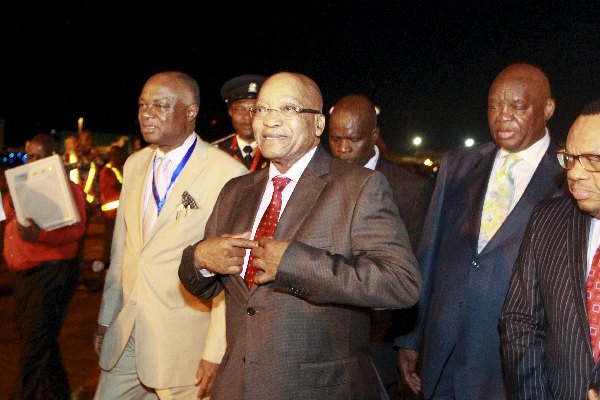S. African president cleared connection to corruption scandal
 |
|
South Africa's President Jacob Zuma (C) arrives at the presidential airport in Abuja, Nigeria, May 28, 2015. [Photo/Agencies] |
CAPE TOWN - South African President Jacob Zuma is not responsible for a corruption scandal in relation to security upgrades of his private home and therefore should not pay back the money, Police Minister Nkosinathi Nhleko said on Thursday.
Nhleko brushed aside allegations that unnecessary facilities were added to the security upgrades of Zuma's private home in Nkandla, KwaZulu-Natal Province.
This refers to the "firepool," the new cattle kraal, chicken coop and culvert, as well as the ampitheatre and visitors center.
These facilities are necessary for a head of state, Nhleko said in Cape Town.
Zuma is still head of state, "even if he is at home," the minister said.
In a report presented to the media, Nhleko said the fire pool and /or swimming pool is a strategic asset useful in fire fighting and therefore a security feature.
The animal enclosure, he explained, keeps livestock away from the security infrastructure and compliments the security fence and is therefore a security feature.
The visitor's center has to cater for the president's distinguished guests and local constituency meetings.
Other facilities also have necessary functions, the minister added.
"Accordingly the State President is therefore not liable to pay for any of the security features," Nhleko said.
The minister said outstanding security related work in Nkandla should be funded and completed expeditiously.
Nhleko's report was a fresh attempt by the government to clear Zuma in the Nkandla scandal, which has haunted Zuma since March last year when Public Protector Thuli Madonsela alleged in a report that Zuma's family unduly benefited from the project which cost 246 million rand (about 21 million US dollars) in public funding.
Madonsela and the opposition alike have demanded that Zuma pay back part of the money lavished on the project, but Zuma has rejected the demand.
The government argues that the money was spent on security upgrades which are necessary for a head of state.





















